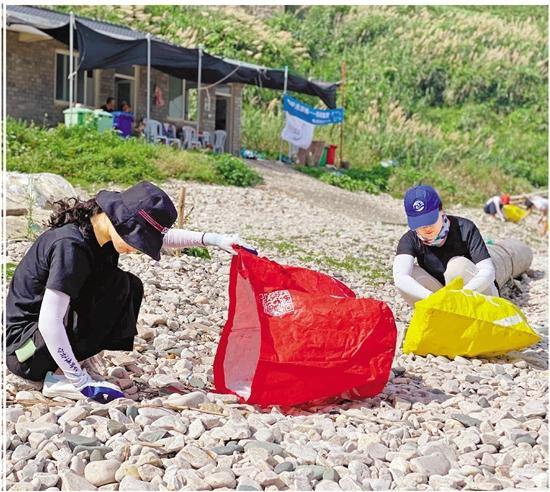Eight months ago, the Lishi Beach of Xifeng Bay on Qingbang Island in Putuo District was occupied by pieces of garbage. But now it has become very beautiful and clean.
In just 3 years, He Li, the founder of Zhoushan Qiandao Marine Environmental Protection Public Welfare Team, has mobilized nearly 10,000 people to participate in coastal cleanup activities, protected more than 50 beaches on 21 islands, cleaned up more than 160 tons of marine litter, and set up 6 marine environmental protection volunteer stations in the local area, making great contributions to the protection of the marine environment.
Coastal cleanup is not as simple as picking up litter
At dawn, the Dongji marine environmental protection volunteer station has gathered small groups of people. Yan Shanyue, the director of the station, was counting the tools and telling the matters needing attention to volunteers. And the volunteers, all dressed in sun protection gear, were in high spirits.
This is the fourth coastal cleanup activity in Qingbang this year. Almost all the rubbish on the Lishi beach is washed ashore from the sea. In the ebbs and flows, the rubbish floating in the sea "hides" in the crevices between the pebbles.
Yan Shanyue led the way with his tools. "Some of the volunteers, such as college students and white-collar workers, come from other places especially, and hurry back after the activities..." Yan frowned as he spoke. "It is a little difficult to recruit volunteers on the island. There are few tourists on weekdays, but at weekends the owners of the guesthouses are busy doing business. Each time the activity has as many as 50 or 60 people or as few as 7 or 8 people to participate in."
Walking through the grass to the Lishi Beach of Xifeng Bay, Chen Liixiang, 71, who lives nearby, greeted them warmly. "Thanks to the cleaning up of the beach, the place is lively again, and business here becomes better," Chen Lixiang said.
Zone, mark, pick up litter... With gloves and trash bags, volunteers waddled along the pebbly beach, looking for trash carefully. And when they met steep places, they had to climb on their hands and feet. After more than 10 minutes of hunched walking, they were drenched in sweat.
Picking up the garbage is the first step, while recording is the most important step. "Each activity will be monitored in a unified way, and data will be sampled and summarized, and finally a report will be produced by specialized agencies." More professional and efficient coastal cleanup activities can provide support for scientific research and government decision-making, according to Mr. Yan.

"This time we spent five hours and picked up 25 kilograms of garbage, most of which were plastic products, waste foam, and old fishing nets. The rubbish becomes less now! The first time I came to pick up rubbish, I worked from day to night with other volunteers." Yan shared the story of their first experience of cleaning up the beach. They spent five hours collecting garbage and six hours sorting and recording, with the result of collecting more than 800 kilograms of marine garbage, including 26 bags of soft drink bottles.
More volunteers join in to form a bigger team
It was twelve o 'clock when Yan back to the station which is also the fishing inn run by Yan. Mr. Yan talks about coastal cleanup activities whenever visitors ask. Sometimes, the visitors join them to clean up the beach.
"Most of the people who come here are with their families. I also want to organize parent-child education activities on marine environmental protection, so that children will realize the importance of marine protection from an early age and more people will participate in protecting marine in the future." Yan said.
A few days later, we met He Li at a lecture. He told us that he had given three speeches that day. "At least 8 million tons of plastic end up in the ocean every year, which is the equivalent of a garbage truck full of plastic dumping it into the ocean every minute, where it may not break down and end up back in the human body..." the audience was shocked by those alarming pictures and videos on the large screen.
At the beginning of the coastal cleanup activities, He Li recruited nearly 60 volunteers to clean up trash on a beach on Qushan Island. One month later, Qiandao Marine Environmental Protection Public Welfare Team of Zhoushan city was established. At present, the team has cooperated with 38 public welfare teams in Zhoushan, initiated more than 11,000 volunteer activities, and held joint activities with public welfare organizations all over the country, such as entering campus and communities to publicize, holding campus environmental education art exhibition, etc.
In the lecture, a spirited old volunteer bustled about in silence. He is Tang Yuming, a deaf volunteer. But his physical handicap does not affect his enthusiasm for volunteering. Once in a coastal cleanup activity, Tang Yueming and other volunteers silently pick up garbage on the beach. After seeing this scene, some tourists took the garbage away on their own initiative... "Silent coastal cleanup activity sometimes enjoys more popular support than sound environmental propaganda." Therefore, He Li said, he hopes to involve volunteers of different ages and different identities to form a larger team to protect the marine environment.
Protect marines in more cutting-edge and professional ways
"Look! My T-shirt was made out of eight plastic bottles." He pointed to his T-shirt and introduced it to us. Waste plastic bottles have a low utilization value and are often discarded into the sea, where they are likely harmful to marine life. While other methods of dealing with garbage like landfill or incineration will give rise to secondary pollution. "By using it to produce recycled fibers, you can turn waste into treasure, allowing finite resources to be recycled indefinitely."

"Protecting the ocean is not enough by coastal cleanup activities. A more fundamental solution should be sought." He Li led us to the Maker Center of the Dinghai Science and Technology Building, the base of his team. On the third floor, a display screen on one side displayed real-time data of marine garbage from each monitoring site.
On June 8, 2018, they released an application named "Jingtan 1339" on Wechat. Once marine garbage is found, users can locate it in a real-time manner and upload the on-site situation to the monitoring platform.
"Technology is a tool and big data is the trend of the future. We want to protect the ocean in a more cutting-edge, professional way." He Li said and he showed us their new technology and equipment. " Big data analysis is more conducive to finding solutions to the source of the marine garbage problem."
"Has the marine environment changed much over the years?" We asked. "Marine conservation is a long-term process and cannot be accomplished overnight. There's been a change in the way people think about environmental protection, which is more important."
Not long ago, He Li won the title of the best volunteer for ecology and environment. "The honor not only belongs to me, but also belongs to the guys who participate in protecting the marine environment together." He said the fact that more and more people are taking action in marine protection is the best tribute to volunteer work.
(Compiled by Ye Ke, translated by Yu Fei)